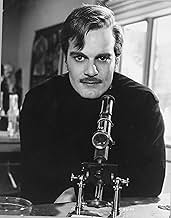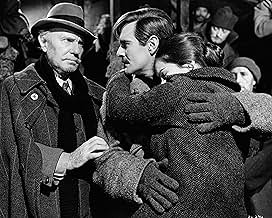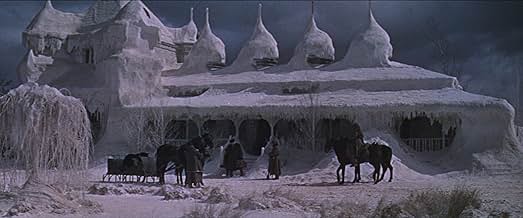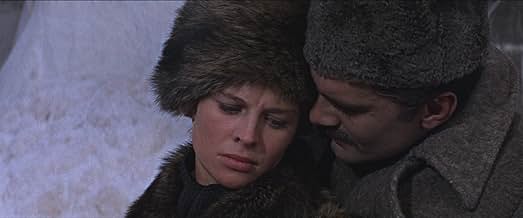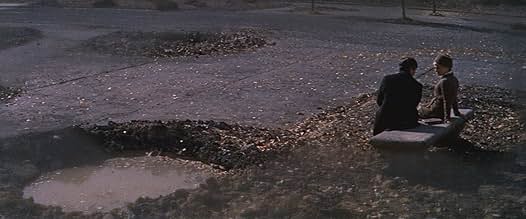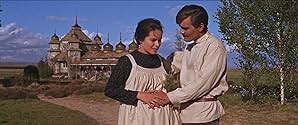A vida do poeta e físico russo que, apesar de casado, se apaixonou pela esposa de um ativista e viveu a Primeira Guerra Mundial e a Revolução de Outubro.A vida do poeta e físico russo que, apesar de casado, se apaixonou pela esposa de um ativista e viveu a Primeira Guerra Mundial e a Revolução de Outubro.A vida do poeta e físico russo que, apesar de casado, se apaixonou pela esposa de um ativista e viveu a Primeira Guerra Mundial e a Revolução de Outubro.
- Direção
- Roteiristas
- Artistas
- Ganhou 5 Oscars
- 21 vitórias e 13 indicações no total
- Liberius
- (as Gerard Tichy)
- Direção
- Roteiristas
- Elenco e equipe completos
- Produção, bilheteria e muito mais no IMDbPro
Resumo
Avaliações em destaque
I also think that you should see this on the big screen back to back with Warren Beatty's Reds. Two very opposite views of the Russian Revolution, one from the inside and one from the outside. You could have a very interesting discussion on which is which.
The title character, played by Omar Sharif, is Dr. Yuri Zhivago who is both doctor and poet. He was orphaned as a child and raised in the house of Ralph Richardson and Siobhan McKenna. He marries their daughter, Geraldine Chaplin who of course he loves, but naturally like a sister.
The real passion of his life is Julie Christie who is married to a committed Bolshevik in Tom Courtenay. Courtenay is also a guy, with shall we say, some issues. She loves him in her own way though and goes to search for him when he volunteers for the army to subvert it as the Bolshevik plan was when Russia entered World War I.
Christie meets Sharif at the front and the passion ignites. But all around them the society they knew and were brought up in is crumbling about them. Their story set against the background of the Russian Revolution is what Doctor Zhivago is all about.
Zhivago knows change was inevitable, the old order in Russia was ready to be toppled. But he's a poet and not one to let his art be subverted for the sake of the state. Fortunately he's also a doctor and his services are needed, in fact the Bolsheviks rather brutally insist on his accompanying one of their brigades as a medical officer.
I still remember as a lad the acclaim Boris Pasternak's novel got world wide when it was published while being banned in his home land. After winning the Nobel Prize for Literature, Pasternak died shortly thereafter. It's a pity he did not live to see this film, I think he would have approved.
From the deserts of Arabia to the steppes of Russia, David Lean certainly knew how to direct a film that involved vastness. Yet the people of his stories be it Lawrence of Arabia or Doctor Zhivago never get lost in the spectacle. Lean makes you care about the characters that Pasternak created, you get involved in the romance of Sharif and Christie, you want to know if they'll make it in this country undergoing revolutionary convulsions.
Other performances of note are Alec Guinness as Sharif's half brother Yevgeny Zhivago, a committed Bolshevik himself and Rod Steiger as the opportunistic Komorovsky.
Doctor Zhivago won a host of awards in several technical categories, strangely enough it wasn't nominated for Best Picture in 1965 though. It is a classic and even now with the Soviet Union a memory, I doubt if even a Russian made remake of Zhivago could equal what David Lean and his wonderful cast gave us in 1965.
The film is a sweeping saga of several people during the period of the Russian Revolution--both before and after. I could summarize the film but considering that there are already over 200 reviews, I'll spare you. At three hours and twenty minutes, oddly, not a lot seemed to occur in the film. I am not complaining or saying it was dull, as it was a lovely film--with very nice cinematography and music. It's just that the film is the type that slowly and deliberately unfolds--and the more hyperactive might not find that to their liking. The acting is quite nice but I think the real star is the direction. My only reservation is that with the great romance between Zhivago (Omar Sharif) and Lara (Julie Christie)--they both were married and Zhivago's wife (Geraldine Chaplin) was a lovely person. This did make it difficult for me to care about the characters more. Still, it's a lovely spectacle and well worth your time.
"Doctor Zhivago" certainly pulled off a coup by showing the conditions that led to the revolution: the czar's despotic rule, the crushing poverty, and forced conscription (especially since the generals cared nothing about the men under their command). Then, of course, the Russian people thought that they would have a workers' society, but it didn't turn out that way. The theme song "Lara's Theme" kept the movie going every step of the way. Maybe not the greatest historical drama of all time, but this is a movie that I recommend to everyone.
Another worthless criticism: It's too slow, too long. Phooey. Some movies have to be slow and long to tell a big, detailed story.
If one is going to criticize this film, I suggest the following: 1. Screenwriter Robert Bolt's kneading of the characters' lives into the progression of the Russian revolution is sometimes at odds with actual chronology, so that anyone familiar with this period cringes from time to time. In one scene, in order to identify for the viewer the historical point that has been reached, a character blurts out (I paraphrase, but only very slightly): "Lenin is in Moscow! Civil war has started!" Neither could have been true at that moment in the narrative. Bolt could have polished his distillation of the novel, but who, apart from direct participants, can ever know why such gaffes occur in high-pressure multi-million-dollar productions? 2. This is yet another movie about a writer, in this case a beloved but politically controversial poet, not a word of whose poetry is revealed to the audience (except for the title of one poem, "Lara," after the woman he loves). Other major movies, including Julia (1977) and Wonder Boys (2000) also commit this offense. Ironically, one exception is the campy and rather dreary Isn't She Great (2000), about trash novelist Jacqueline Susann, which actually explores the act of writing! 3. The physical reproduction of the era is uneven. Some moments are too clean. One example: When Zhivago slides open the door of the ostensibly foul-smelling box car in which he and his family have been traveling for weeks packed alongside filthy, probably lice-ridden passengers, he looks too healthy, scrubbed and well rested. This and other moments stand out because they occur in the context of innumerable convincing depictions such as mud-filled wartime trenches, a looted and vandalized city mansion, or a half-frozen refugee tramping stiffly over the ice of a frozen lake. 4. It is said that Russian viewers laugh at the onion-domed house where the lovers hide from the Bolsheviks. Russian churches have onion domes, they say, but not houses. Granted. But I'd like to think that the person who built this particular house was an eccentric and got away with the concept because the house was in an isolated rural area away from the prying eyes of the "architecture police."
In any case, the emotional truths underlying the occasional inadequate or wrongheaded representations register powerfully. The grand-scale perspective gives a sense of the tumult of the times; vivid and memorable casting choices keep us fascinated with the characters and concentrated upon them; you feel the terrible losses people suffered when history so rudely pulled the rug out from under them; you are reminded of the pitiless cruelty of war and the depths to which people in its grip can descend; and how despite the tragedies of our history, we go on no matter what. David Lean had a great gift for injecting bold images at just the right moment. And he had the same gift for the perfectly timed sound effect, often occurring at an edit point. At Zhivago's end one feels a tremendous sense of sadness and loss but hope for the future. Considering the international political climate of the time of its release, it treats the Russian Revolution with enough detachment to illuminate both sides of the political divide. In other words, it doesn't propagandize for either side.
This was the first major Hollywood treatment of the Russian Revolution, was still running in theatres around the world two and three years after its initial release, despite dismissals from most of the major film critics of the time. Its popularity came from word of mouth, i.e., from the public's genuine love of the story and its striking, technically expert presentation. Interestingly, Zhivago as a box office blockbuster was second only to The Sound of Music, released the same year. Both films told the story of individuals faced with historically recent Old World political upheavals (communism/fascism). Furthermore, the soundtrack album of each film took on a life of its own, selling millions of copies. And why not also add that central to the success of each film was an English actress named Julie (Christie as Lara/Andrews as Maria). How many times have you heard of or personally known a woman under 40 with the previously uncommon name of Lara? Guess why that name became popular in the 60's and afterward?
Você sabia?
- CuriosidadesThis movie wasn't shown in Russia until 1994.
- Erros de gravaçãoThe little girl who plays Tonya at Yuri's mother's funeral starts to cross herself in the Roman Catholic manner, but quickly corrects herself and finishes in the Russian Orthodox style.
- Citações
Komarovski: Lara, I am determined to save you from a dreadful error. There are two kinds of men, and only two, and that young man is one kind. He is high-minded. He is pure. He is the kind of man that the world pretends to look up to and in fact despises. He is the kind of man who breeds unhappiness; particularly in women. Now, do you understand?
Lara: No.
Komarovski: I think you do. There's another kind. Not high-minded. Not pure. But alive. Now that your taste at this time should incline towards the juvenile is understandable. But for you to marry that boy would be a disaster. Because there's two kinds of women...
[Lara covers her ears, he forces her arms down]
Komarovski: There are two kinds of women and you - as we well know - are not the first kind.
[Lara slaps him, he slaps her back]
Komarovski: You, my dear, are a slut.
Lara: I am not!
Komarovski: We'll see.
- Versões alternativasWhen it was first released, the film originally ran 197 minutes. Early in its run, David Lean and editor Norman Savage shortened it to 180 minutes; this version was in circulation for years. By the mid-1990s, the uncut version was restored.
- ConexõesEdited into Hollywood: The Dream Factory (1972)
Principais escolhas
Detalhes
- Data de lançamento
- Países de origem
- Central de atendimento oficial
- Idiomas
- Também conhecido como
- Doctor Zhivago
- Locações de filme
- Morley Flats, Alberta, Canadá(Frozen house longshots)
- Empresas de produção
- Consulte mais créditos da empresa na IMDbPro
Bilheteria
- Orçamento
- US$ 11.000.000 (estimativa)
- Faturamento bruto nos EUA e Canadá
- US$ 111.721.910
- Faturamento bruto mundial
- US$ 112.090.394
- Tempo de duração3 horas 17 minutos
- Cor
- Proporção
- 2.35 : 1
Contribua para esta página








